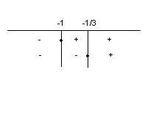[math]|2x-3|-1=(2x-1)/2[/math]
[math]|2x-3|-1=(2x-1)/2[/math]
; Studiamo il segno dell'argomento del modulo [math]2x-3 \geq 0[/math]
; [math]2x \geq 3 \Rightarrow x \geq 3/2[/math]
. Quindi per
[math]x \geq 3/2[/math]
, si ha: [math]|2x-3|-1=(2x-1)/2[/math]
è equivalente all'equazione [math]2x-3-1=(2x-1)/2[/math]
; Il m.c.m. è [math]2[/math]
, quindi si ha [math](4x-6-2)/2=(2x-1)/2[/math]
Moltiplichiamo ambo i membri per [math]2[/math]
[math]4x-8=2x-1[/math]
Semplificando [math]2x=7 \Rightarrow x=7/2[/math]
. Soluzione accettabile, poichè [math]x=7/2>3/2[/math]
. Mentre, per
[math]x abbiamo
[math]-2x+3-1=(2x-1)/2[/math]
Il m.c.m. è [math]2[/math]
, quindi si ha [math](-4x+6-2)/2=(2x-1)/2[/math]
Moltiplichiamo ambo i membri per [math]2[/math]
[math]-4x+4=2x-1[/math]
Semplificando [math]-6x=-5 \Rightarrow x=5/6[/math]
. Soluzione accettabile, poichè [math]x=5/6>3/2[/math]
. Soluzione non accettabile, poichè [math]x=-1/5> -1[/math]
. Quindi la soluzione dell'equazione di partenza sarà [math]S={5/6; 7/2}[/math]
. 
